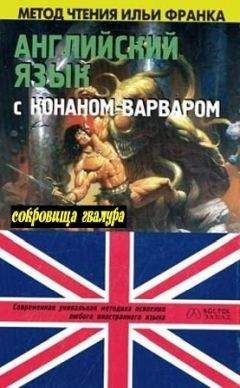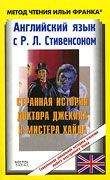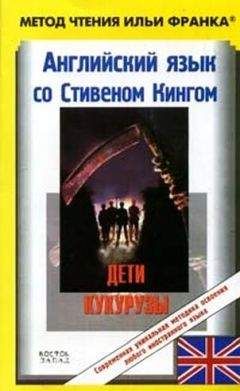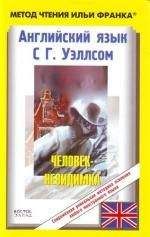neither [ˈnaɪðə], decay [dɪˈkeɪ], voluptuous [vəˈlʌpʧuəs]
It was no effigy of stone or metal or ivory. It was the actual body of a woman, and by what dark art the ancients had preserved that form unblemished for so many ages Conan could not even guess. The very garments she wore were intact — and Conan scowled at that, a vague uneasiness stirring at the back of his mind. The arts that preserved the body should not have affected the garments. Yet there they were — gold breast-plates set with concentric circles of small gems, gilded sandals, and a short silken skirt upheld by a jeweled girdle. Neither cloth nor metal showed any signs of decay.
Yelaya was coldly beautiful, even in death. Her body was like alabaster, slender yet voluptuous; a great crimson jewel gleamed against the darkly piled foam of her hair.
Conan stood frowning down at her (Конан стоял, неодобрительно глядя на нее /сверху/ вниз; to frown — смотреть неодобрительно; хмурить брови), and then tapped the dais with his sword (а затем обстукал помост мечом; to tap — вынимать пробку; постукивать, обстукивать). Possibilities of a hollow containing the treasure occurred to him (ему в голову пришли возможности о полости = пришла мысль о возможной полости, содержащей сокровища; to occur — случаться; приходить на ум), but the dais rang solid (но помост звучал, как цельный; solid — твердый; сплошной; цельный, без пробелов; to ring — звучать). He turned and paced the chamber in some indecision (он повернулся и в какой-то нерешительности измерил комнату шагами; to pace — шагать; измерять шагами). Where should he search first, in the limited time at his disposal (где ему искать сначала при ограниченном времени в его распоряжении)? The priest he had overheard babbling to a courtesan had said the treasure was hidden in the palace (жрец, болтовню которого с куртизанкой он подслушал, говорил, что сокровище спрятано во дворце; to overhear — подслушать; нечаянно услышать). But that included a space of considerable vastness (но это включало в себя пространство значительных размеров; to include — включать в себя, заключать; vast — обширный, громадный; безбрежный, пространный). He wondered if he should hide himself (он задался вопросом, а не спрятаться ли ему) until the priests had come and gone (пока не придут и не уйдут жрецы; to go — идти; уходить), and then renew the search (а потом возобновить поиски). But there was a strong chance that they might take the jewels with them when they returned to Keshia (но был серьезный риск/большая вероятность, что они могут забрать драгоценности с собой, когда будут возвращаться в Кешу; strong — сильный; значительный; серьезный; chance — случайность; шанс, возможность, вероятность; риск). For he was convinced that Thutmekri had corrupted Gorulga (ибо он был убежден, что Тутмекри подкупил Горулгу).
courtesan [ˌkɔ:tɪˈzæn], considerable [kənˈsɪdərəbl], corrupt [kəˈrʌpt]
Conan stood frowning down at her, and then tapped the dais with his sword. Possibilities of a hollow containing the treasure occurred to him, but the dais rang solid. He turned and paced the chamber in some indecision. Where should he search first, in the limited time at his disposal? The priest he had overheard babbling to a courtesan had said the treasure was hidden in the palace. But that included a space of considerable vastness. He wondered if he should hide himself until the priests had come and gone, and then renew the search. But there was a strong chance that they might take the jewels with them when they returned to Keshia. For he was convinced that Thutmekri had corrupted Gorulga.
Conan could predict Thutmekri's plans, from his knowledge of the man (Конан мог предсказать планы Тутмекри по своим знаниям этого человека = по тому, что он знал об этом человеке). He knew that it had been Thutmekri who had proposed the conquest of Punt to the kings of Zembabwei (он знал, что это был Тутмекри, который = именно Тутмекри предложил завоевание Пунта королям Зембабвей), which conquest was but one move toward their real goal (завоевание которого было лишь одним шагом к их истинной цели; move — движение; шаг) — the capture of the Teeth of Gwahlur (захвату Зубов Гвалура). Those wary kings would demand proof that the treasure really existed before they made any move (эти осторожные короли потребовали бы доказательства того, что сокровище действительно существует, прежде чем они предприняли бы какие-либо действия; to make a move — предпринять действие/попытку). The jewels Thutmekri asked as a pledge would furnish that proof (драгоценности, которые Тутмекри попросил в качестве залога, предоставили бы это доказательство; to furnish — снабжать, доставлять; предоставлять).
knowledge [ˈnɔlɪʤ], goal [ɡəul], exist [ɪɡˈzɪst]
Conan could predict Thutmekri's plans, from his knowledge of the man. He knew that it had been Thutmekri who had proposed the conquest of Punt to the kings of Zembabwei, which conquest was but one move toward their real goal — the capture of the Teeth of Gwahlur. Those wary kings would demand proof that the treasure really existed before they made any move. The jewels Thutmekri asked as a pledge would furnish that proof.
With positive evidence of the treasure's reality (при несомненном доказательстве о реальности сокровищ; positive — позитивный, реальный; несомненный, определенный; evidence — ясность, наглядность; доказательство, подтверждение), the kings of Zimbabwei would move (короли Зимбабвей начали бы действовать; to move — двигать; начинать действовать). Punt would be invaded simultaneously from the east and the west (в Пунт вторглись бы одновременно с востока и запада), but the Zembabwans would see to it that the Keshani did most of the fighting (но зембабвийцы позаботились бы о том, чтобы кешанцы выполнили большую часть военных действий; to see to smth. — присматривать за чем-л., заботиться о чем-л.; to do — делать; выполнять, осуществлять, исполнять; fighting — бой, сражение; битва, война), and then, when both Punt and Keshan were exhausted from the struggle (а потом, когда как Пунт, так и Кешан были бы истощены сражениями; both… and — как…, так и; struggle — борьба; сражение, битва), the Zembabwans would crush both races (зембабвийцы сокрушили бы оба народа; to crush — давить, дробить; сокрушить, уничтожить;race — племя; народ, нация), loot Keshan and take the treasure by force (ограбили бы Кешан и захватили бы сокровища силой; by force — силой), if they had to destroy every building and torture every living human in the kingdom (/даже/ если им пришлось бы уничтожить каждое здание и замучить каждого человека в королевстве; to have to do smth. — быть должным, обязанным, вынужденным что-л. делать; to torture — пытать; мучить).
But there was always another possibility (но всегда была и другая возможность): if Thutmekri could get his hands on the hoard (если Тутмекри смог бы заполучить сокровищницу; to get one’s hands on — заполучить, прибрать к рукам; hoard — тайный склад; сокровищница), it would be characteristic of the man to cheat his employers (для этого человека характерно было бы надуть своих нанимателей; to cheat — жульничать, надувать), steal the jewels for himself and decamp (украсть драгоценности для себя и скрыться; to decamp — собирать лагерь; убегать, сниматься с места; скрываться /с чем-л., кем-л./), leaving the Zembabwan emissaries holding the sack (оставив зембабвийских агентов расхлебывать кашу; to leave smb. holding the bag/sack — подвести кого-л., свалить ответственность на кого-л., заставить кого-л. расхлебывать кашу: «оставить кого-л. держать мешок»).
evidence [ˈevɪdəns], simultaneous [ˌsɪməlˈteɪnɪəs], exhaust [ɪɡˈzɔ:st]
With positive evidence of the treasure's reality, the kings of Zimbabwei would move. Punt would be invaded simultaneously from the east and the west, but the Zembabwans would see to it that the Keshani did most of the fighting, and then, when both Punt and Keshan were exhausted from the struggle, the Zembabwans would crush both races, loot Keshan and take the treasure by force, if they had to destroy every building and torture every living human in the kingdom.
But there was always another possibility: if Thutmekri could get his hands on the hoard, it would be characteristic of the man to cheat his employers, steal the jewels for himself and decamp, leaving the Zembabwan emissaries holding the sack.
Conan believed that this consulting of the oracle was but a ruse to persuade the king of Keshan to accede to Thutmekri's wishes (Конан считал, что эта консультация с оракулом = это испрашивание совета у оракула было лишь уловкой, чтобы убедить царя Кешана согласиться с пожеланиями Тутмекри; to accede — соглашаться) — for he never for a moment doubted that Gorulga was as subtle and devious as all the rest mixed up in this grand swindle (ибо он никогда, ни на мгновение не сомневался, что Горулга такой же коварный и лживый, как все остальные, замешанные в этом грандиозном мошенничестве; subtle — нежный; хитрый, коварный; devious — удаленный; неискренний, нечестный;to be mixed up — быть замешанным). Conan had not approached the high priest himself (сам Конан не приближался к верховному жрецу), because in the game of bribery he would have no chance against Thutmekri (потому что в игре со взятками он не имел бы никаких шансов против Тутмекри; to bribe smb. — давать взятку кому-л.), and to attempt it would be to play directly into the Stygian's hands (и сделать попытку в этом было бы = означало бы сыграть непосредственно на руку стигийцу; to play into smb’s hands — играть на руку кому-л.). Gorulga could denounce the Cimmerian to the people (Горулга мог бы обвинить киммерийца перед народом), establish a reputation for integrity (упрочить репутацию /своей/ честности; to establish — учреждать; упрочивать /репутацию, положение в обществе/), and rid Thutmekri of his rival at one stroke (и избавить Тутмекри от его соперника одним ударом; to rid — освобождать, избавлять). He wondered how Thutmekri had corrupted the high priest (ему было интересно, каким образом Тутмекри подкупил верховного жреца; to wonder — удивляться; интересоваться), and just what could be offered as a bribe to a man (и что именно можно было предложить в качестве взятки человеку; just — как раз, именно) who had the greatest treasure in the world under his fingers (у которого под пальцами = в руках которого было величайшее сокровище в мире; under — под; указывает на нахождение под властью, контролем, командованием, в подчинении у кого-л.).
persuade [pəˈsweɪd], accede [ækˈsi:d], devious [ˈdi:vɪəs]
Conan believed that this consulting of the oracle was but a ruse to persuade the king of Keshan to accede to Thutmekri's wishes — for he never for a moment doubted that Gorulga was as subtle and devious as all the rest mixed up in this grand swindle. Conan had not approached the high priest himself, because in the game of bribery he would have no chance against Thutmekri, and to attempt it would be to play directly into the Stygian's hands. Gorulga could denounce the Cimmerian to the people, establish a reputation for integrity, and rid Thutmekri of his rival at one stroke. He wondered how Thutmekri had corrupted the high priest, and just what could be offered as a bribe to a man who had the greatest treasure in the world under his fingers.





